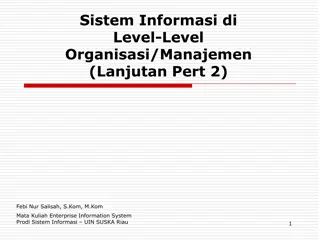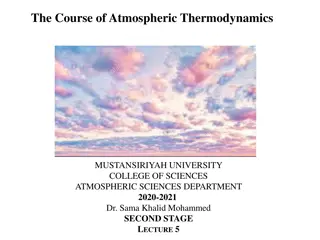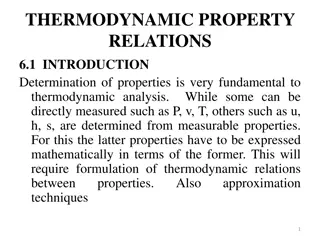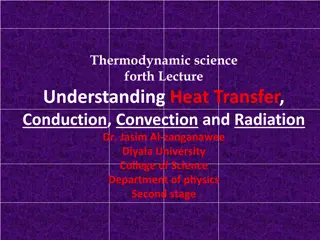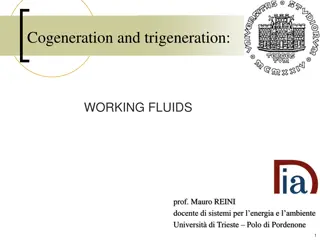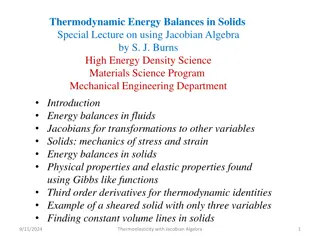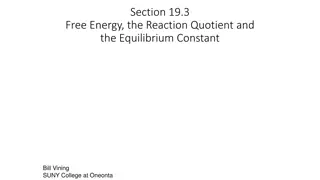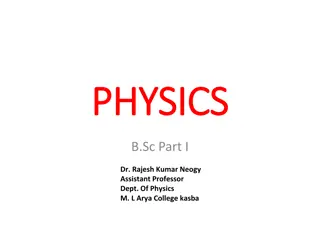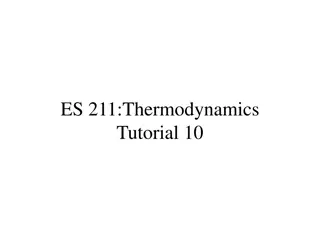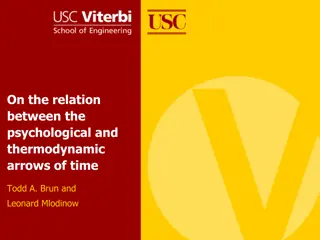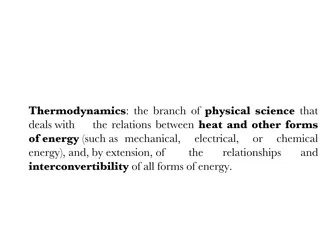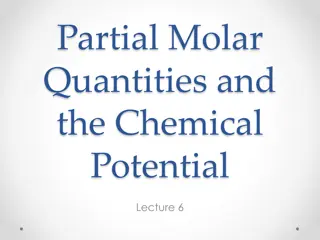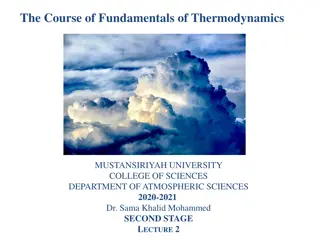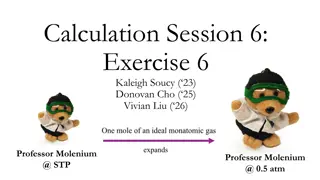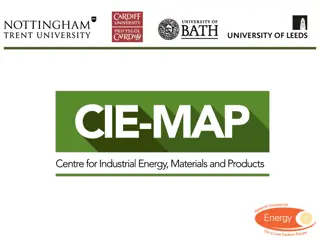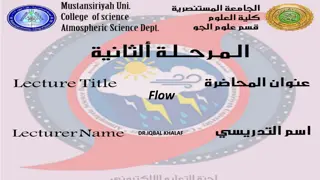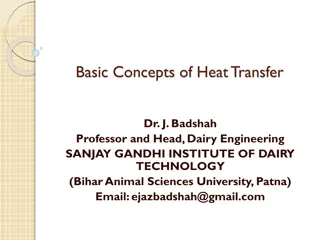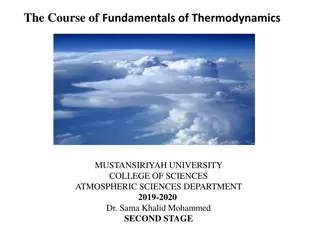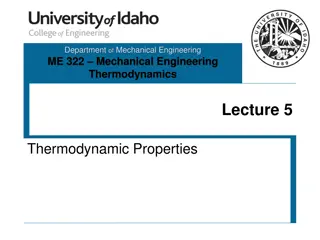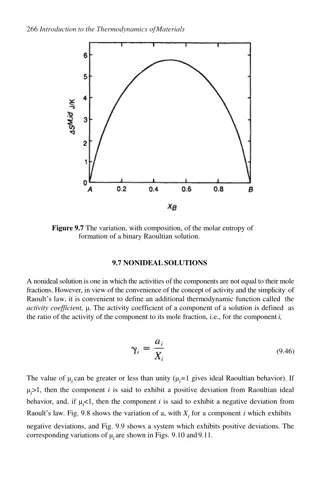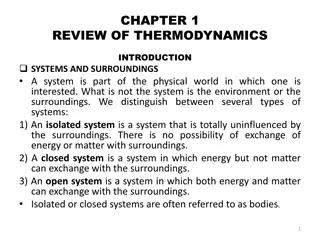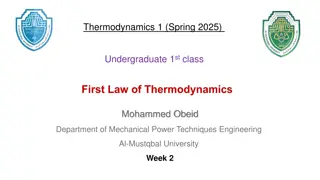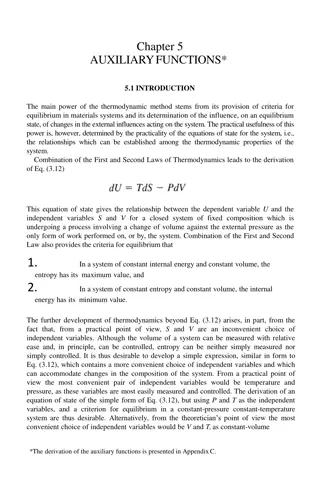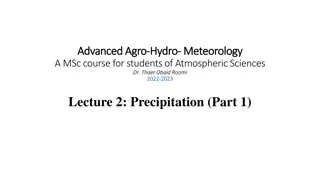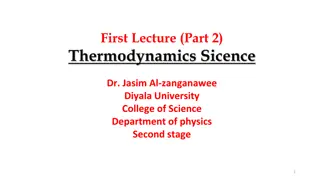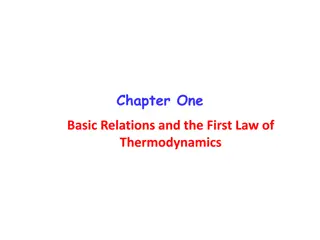Information Systems in Organizational Management
Management in organizations is divided into three levels: operational, tactical, and strategic. Each level requires different information systems to support various activities. Operational systems focus on routine transactions and control processes, while middle-level systems aid in semi-structured
11 views • 39 slides
Thermodynamic and Kinetic Characteristics in Adsorption Systems
Explore the thermodynamics and kinetics of adsorption through discussions on equilibrium thermodynamics, adsorption isotherms, kinetic measurements, technical applications, and interaction forces. Learn about the distinctions between physisorption and chemisorption, as well as the terminology associ
0 views • 7 slides
Atmospheric Thermodynamics in Second Stage Lecture
Explore key concepts in atmospheric thermodynamics, including condensation level, free convection level, and the use of thermodynamic diagrams. Learn about the process of condensation, stability levels in the atmosphere, and the significance of free convection in weather patterns. Discover why therm
0 views • 27 slides
Optimization of Thermodynamic Balance Control in LEO Biosphere 2
The Landscape Evolution Observatory (LEO) within Biosphere 2 is a groundbreaking research site using advanced sensors to monitor and study water, carbon, and energy cycling in artificial landscapes. A team is working on optimizing thermodynamic control systems to maintain stable temperatures in LEO'
0 views • 12 slides
Fundamentals of Thermodynamic Property Relations
Determining thermodynamic properties is crucial for analysis, involving direct and derived properties expressed through formulations and relations. Partial derivatives, fundamental relations like the 1st and 2nd laws, and functions such as enthalpy, Helmholtz, and Gibbs are explored. Maxwell relatio
5 views • 56 slides
Thermodynamic Principles of Polymers in Solution: Flory-Huggins Theory and Macromolecular Solutions
Understanding the thermodynamic behavior of polymers in solution is crucial in various industrial and scientific applications. The Flory-Huggins theory provides insights into athermal macromolecular solutions, heat of mixtures, interaction parameters, and the concept of good vs. mediocre solvents. T
1 views • 77 slides
Understanding Heat Transfer in Thermodynamics Lecture
This thermodynamics lecture covers essential topics such as heat transfer, conduction, convection, and radiation. Dr. Jasim Al-zanganawee from Diyala University explains Thermodynamic Processes, Internal Energy, Properties of a System, and Thermodynamic Cycles. Students will learn about extensive an
0 views • 11 slides
Optimizing Combined Heat and Power Systems in Alumina Refineries
Thermodynamics plays a crucial role in optimizing Combined Heat and Power (CHP) systems in process industries like Alumina Refineries. This study focuses on minimizing losses and maximizing efficiency through energy, exergy, and thermodynamic analysis. By reconfiguring the system and utilizing low-g
0 views • 9 slides
Working Fluids in Thermodynamic Systems
Working fluids are essential in thermodynamic systems to transfer energy and perform work. This article explores the selection criteria, types, and work calculation involving working fluids in cogeneration and trigeneration systems. The properties, fluid types, and work processes are discussed to un
1 views • 14 slides
Thermodynamic Energy Balances in Solids with Jacobian Algebra
Explore the intricacies of energy balances in solids through the lens of Jacobian algebra, covering topics such as mechanics of stress and strain, Gibbs-like functions for physical properties, and third-order derivatives for thermodynamic identities. Unravel the application of Jacobians for transfor
2 views • 26 slides
Free Energy, Reaction Quotient, and Equilibrium Constant
This educational material delves into the concepts of free energy, reaction quotients, and equilibrium constants in chemical systems. It explains how to determine the direction of a reaction based on Q and K values, elucidates the role of Gibbs free energy in determining spontaneity, and provides ca
0 views • 10 slides
Information Systems in Organizations: Overview and Implementation
Information systems play a crucial role in organizations, encompassing transaction processing systems, functional area information systems, and enterprise resource planning systems. This content delves into the purpose of transaction processing systems, the support provided by information systems ac
3 views • 30 slides
Heat Transfer and Thermal Insulation
Explore the concepts of heat transfer, thermal insulation, thermodynamic systems, temperature, and means of heat transfer. Learn about conduction, convection, and radiation and how they impact the equilibrium and transfer of thermal energy. Gain insights into designing containers to minimize heat lo
1 views • 30 slides
Introduction to Thermodynamics: Laws, Concepts, and Applications
Thermodynamics is the study of energy and its transformations within systems. This article delves into the laws of thermodynamics, defining key quantities like temperature and entropy. It explains the importance of thermodynamic systems, boundaries, and surroundings, highlighting closed, open, and i
2 views • 12 slides
Thermodynamics Tutorial: Exergy Analysis of Processes
In this tutorial, we delve into the analysis of thermodynamic processes through the concept of exergy. We explore the determination of exergy destroyed, reversible work, equilibrium temperatures, wasted work potential, and more in various scenarios involving insulated systems. Detailed calculations
2 views • 15 slides
Exploring the Relationship Between the Psychological and Thermodynamic Arrows of Time
Time, as a fundamental concept, exhibits a unidirectional flow from past to future, captured in both psychological and thermodynamic contexts. This article delves into the intriguing interplay between Newtonian dynamics and our intuitive perception of time's arrow, highlighting the challenges in rec
0 views • 28 slides
Thermodynamics: The Science of Energy Relations
Thermodynamics is a branch of physical science that focuses on the relationships between heat and various forms of energy, exploring the interconvertibility of energy types. It involves the study of systems, surroundings, phases, components, and reactions, with a primary focus on macroscopic energie
1 views • 99 slides
Air Conditioning and Psychrometrics in HVAC Systems
Air conditioning systems in HVAC aim to control temperature, humidity, air movement, and air quality for comfort and process control. Psychrometrics studies air-water vapor mixtures, with key parameters like dry bulb temperature and relative humidity. Important psychrometric processes involve adiaba
0 views • 65 slides
Embedded Systems and Cyber-Physical Systems
Embedded systems are specialized computer systems embedded within larger systems, such as control systems and car controllers. This lecture covers real-time aspects, applications of Cyber-Physical Systems (CPS), and examples like the Boeing 777/Airbus A380 cockpit. It discusses the design process of
1 views • 22 slides
Thermodynamic Calculators for Comprehensive Analysis of Systems, Processes, and Cycles
Explore a series of simplification in the TESTcalc Tree, leading to the accurate analysis tool system states and basic tools for uniform and non-uniform systems. Access TESTapps for a variety of thermodynamic calculators catering to specific, generic, mixing, non-mixing, and combustion systems, alon
0 views • 12 slides
Exergy, Economic Growth, and Degrowth: A Critical Perspective
This presentation delves into the relationship between exergy, economic growth, and degrowth from a thermodynamic perspective, exploring the origins of exergy-economics and physical ideas. It emphasizes the importance of exergy as a measure of useful work in economic systems, contrasting energy and
2 views • 39 slides
Partial Molar Quantities and Chemical Potential
Exploring partial molar quantities and chemical potential in thermodynamics helps us understand how system variables change with composition alterations. Through concepts like partial molar volumes and Gibbs free energy, we can delve into the intricate dynamics of thermodynamic systems and their beh
0 views • 23 slides
The Fundamentals of Thermodynamics in Atmospheric Sciences
Explore the key concepts of thermodynamics in atmospheric sciences as discussed in the second stage lecture, covering topics such as extensive versus intensive variables, reversible and irreversible processes, cyclic processes, and thermodynamic variables. Gain insights into properties of systems, w
1 views • 22 slides
Thermodynamic Properties of Magnetic Substances
Delve into the thermodynamic potential, free energy, and magnetization of magnetic substances in relation to electric and magnetic fields, exploring the intricacies of irreversible processes, work done, and energy densities.
0 views • 14 slides
Energy Distribution in Molecular Systems
Energy distribution in molecular systems is crucial for determining thermodynamic properties. The most probable configuration of energy at equilibrium leads to the Boltzmann distribution. Configurations represent the total energy available to the system, while microstates describe individual oscilla
0 views • 75 slides
Thermodynamic Processes
The concepts of internal energy, enthalpy, and entropy through a breakdown of a thermodynamic problem involving different paths and states. Gain insights into reversible and irreversible processes, state functions, and path independence. Discover the calculations and relationships between temperatur
0 views • 12 slides
More Heat Than Light: The Use and Abuse of Thermodynamic Ideas
This article delves into the historical development of thermodynamic laws, the UK's energy use for heat, and the concepts of energy and exergy beyond traditional engineering applications. It critiques the misuse of thermodynamic ideas and explores the evolution of these laws in industrial innovation
0 views • 18 slides
Understanding Flood Dynamics and Thermodynamic Calculations in Chemical Reactions
This content delves into the concepts of flooding, river flows, and thermodynamic calculations related to chemical reactions. It discusses the causes and impacts of floods, emphasizing how they occur in various river channels. Additionally, it explains the application of the first law of thermodynam
0 views • 9 slides
Understanding Basic Concepts of Heat Transfer and Thermodynamics
Explore the fundamental principles of heat transfer and thermodynamics including thermodynamic equilibrium, properties of systems, thermodynamic terms, temperature measurement methods, calibration, units of heat and temperature, and more. Enhance your knowledge in this essential area of science and
0 views • 7 slides
Fundamentals of Thermodynamics at Mustansiriya University
Explore the principles of thermodynamics in this comprehensive course at Mustansiriya University's College of Sciences. Topics covered include systems, energy transformations, atmospheric thermodynamics, and definitions related to thermodynamic processes.
0 views • 27 slides
Understanding Thermodynamic Properties and Behavior of Substances
Explore the importance of studying thermodynamic properties, phases of matter, and the behavior of pure substances like water in thermodynamics. Learn about key concepts such as state, property, process, and their interrelations in energy conversion systems.
0 views • 18 slides
Understanding Activity Coefficients and Deviations in Thermodynamic Solutions
Explore the concept of activity coefficients and deviations in nonideal solutions, where components do not follow Raoult's law. Learn how temperature affects deviations and the molar heats of mixing in binary systems. Discover the thermodynamics of materials in a comprehensive manner.
2 views • 24 slides
Introduction to Thermodynamics: Systems, Surroundings, and State Variables
Understanding thermodynamics involves the study of systems and their surroundings, classified as isolated, closed, or open. Thermodynamics explores concepts such as heat flow, energy, and entropy, while utilizing state variables to describe equilibrium states of a system. State variables like temper
0 views • 42 slides
Mechanical Engineering Thermodynamics Exam Review
Get ready for your Mechanical Engineering Thermodynamics Exam with this review covering topics like working with moles and mass, using English and SI units, identifying system types, applying thermodynamic models, understanding thermodynamic properties, and more.
0 views • 6 slides
Understanding Thermodynamics Fundamentals in Mechanical Engineering
Explore the basics of thermodynamics including the First Law, energy equations, ideal gas laws, and applications in a steam plant. Learn about energy conservation principles, steady flow equations, and different forms of energy in thermodynamic systems.
0 views • 19 slides
Thermodynamic Method for Equilibrium Criteria in Materials Systems
Learn about the thermodynamic method's power in determining equilibrium in materials systems, the practicality of equations of state, and the development of auxiliary functions to accommodate changes in composition and work forms other than P-V work.
0 views • 27 slides
Understanding Thermodynamic Probability in Statistical Physics
Explore the concept of thermodynamic probability in statistical physics, where the number of microstates of a macrostate defines its probability. Learn how to calculate meaningful arrangements and the occurrence probability of different macrostates in a system of distinguishable particles.
1 views • 18 slides
Advanced Agro-Hydro-Meteorology Course: Precipitation Dynamics and Thermodynamic Laws
Explore the intricate relationship between precipitation forms, water vapor, and thermodynamic laws in the field of atmospheric sciences. Learn about the laws governing precipitation, potential temperature, and the Clausius-Clapeyron Equation, vital for understanding weather patterns. Dive into topi
0 views • 16 slides
Understanding Thermodynamic Processes in Science - Lecture Insights
Explore the world of thermodynamics with Dr. Jasim Al-zanganawee at Diyala University, covering topics like thermodynamic equilibria, processes, and cycles. Learn about isothermal, adiabatic, isochoric, and isobaric processes, as well as reversible and irreversible processes. Gain a deeper understan
0 views • 14 slides
Basic Relations and the First Law of Thermodynamics Explained
Understand the fundamental concepts of thermodynamics such as thermodynamic systems, properties, phases, and processes. Learn about the identification of systems and their environments, as well as the distinction between intensive and extensive properties. Explore the importance of boundaries, prope
0 views • 64 slides
